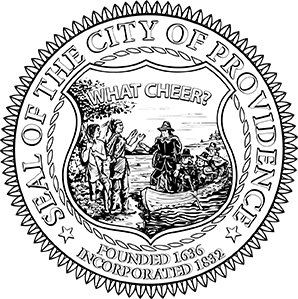Treaty affirms Providence’s commitment to protect, restore and enhance urban habitats for migratory birds
Monday, May 6, 2019
PROVIDENCE R.I. – Mayor Jorge O. Elorza today joined U.S. Senator Jack Reed, U.S. Fish and Wildlife Service Northeast Regional Director Wendi Weber, Superintendent of Providence Parks Wendy Nilsson and community partners to sign an Urban Conservation Treaty for Migratory Birds. The treaty will designate Providence as an Urban Bird Treaty City, one of only 30 cities nationwide to achieve this distinction.
The goal of the Urban Bird Treaty program is to conserve urban habitats for birds, reduce urban hazards to birds, and educate and engage urban communities in caring about and conserving birds and their habitats. The treaty between the City of Providence and the U.S. Fish and Wildlife Service acknowledges the importance of these local efforts in achieving migratory bird conservation and improving the health and well-being of people in urban areas.
“Migratory birds add to the biodiversity of our ecosystem and have a unique importance in our City due to their economic, ecological and cultural value,” said Mayor Jorge Elorza. “By reaffirming our commitment to conserving the habitats of these ecologically essential birds, we are recognizing our shared responsibility to care for them and the lands they fly over during their incredible journeys.”
The Partnership for Providence Parks was awarded an Urban Bird Treaty grant of $49,358 from the National Fish and Wildlife Foundation and U.S. Fish and Wildlife Service to support bird conservation and education efforts carried out in partnership with the Audubon Society of Rhode Island, the RI Zoological Society, the RI Department of Environmental Management, Woonasquatucket River Watershed Council, the Nature Conservancy, and other conservation-based organizations throughout the City.
“This federal designation as an Urban Bird Treaty city recognizes Providence’s outstanding commitment to protecting and conserving bird populations and their ecosystems. The grant will help with both habitat restoration efforts and environmental education and outreach,” said Senator Reed, a senior member of the Appropriations Subcommittee on Interior & Environment, which oversees federal funding for the U.S. Fish and Wildlife Service. “Birds are a keystone species and they are beneficial in so many ways, like keeping insect populations down. Our feathered friends have a great champion in Mayor Elorza and the Providence Parks Department, so they are surely singing their praises today. And I want to add my congratulations and appreciation to all the partners who helped Providence achieve this distinction. Ultimately, enhancing the habitat for birds makes Providence a healthier, more livable city for people too.”
Through this program, the City is creating opportunities for residents and visitors to learn about and connect with birds throughout the City. Free guided bird walks, led by members of the Audubon Society of Rhode Island, are offered monthly in ten different Providence Parks. In addition, biannual bird banding programs allow the public to get an up-close look at birds and allow scientists to track migration patterns internationally.
“The U.S. Fish and Wildlife Service is proud to designate Providence as an Urban Bird Treaty city and support the many dedicated partner organizations working here to restore habitat in local parks, deepen people’s connection with nature, and conserve our migratory birds through community education, science, and stewardship,” said U.S. Fish and Wildlife Service Northeast Regional Director Wendi Weber.
The City of Providence offers teacher training presented by the Roger Williams Park Zoo and the Providence Urban Wildlife Refuge Partnership with support from the U.S. Fish and Wildlife Service and the Rhode Island Department of Environmental Management. Through the Teacher Institute, 41 Providence teachers have received valuable experiences and resources to create unique outdoor learning opportunities for students to participate in community science that connects them to local flora and fauna in schoolyards and public parks. Partners are also engaging communities in habitat restoration in local parks using native plants that add valuable shelter and food sources for migratory birds.
Though a partnership with the RI Department of Environmental Management, teachers who take part in this Teacher Institute are also given the opportunity to bring their class of students to a National Wildlife Refuge, free of charge, where they can make connections to other natural areas in the state that many have never visited before. To date, over 1,000 Providence students have visited the RI National Wildlife Refuges over the past five years
###
About the Urban Bird Treaty Program: The Urban Bird Treaty program is a collaborative effort between the U.S. Fish and Wildlife Service and participating U.S. cities. Launched in 1999, the first treaty was signed with New Orleans and the second with Chicago in 2000. Since that time, an additional 28 cities have become Urban Bird Treaty cities, for a total of 30 spanning from Alaska to Alabama. To learn more about the Urban Bird Treaty program all the cities involved with this partnership, visit: fws.gov/birds/grants/urban-bird-treaty.php and the storymap of Urban Bird Treaty Cities from around the country at: http://bit.ly/UBTCITIES

